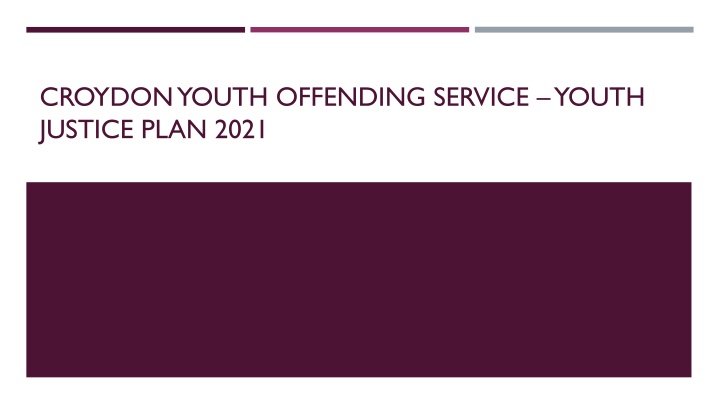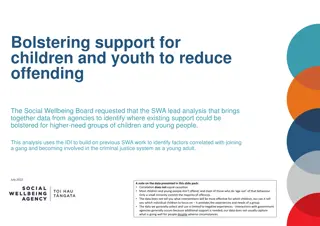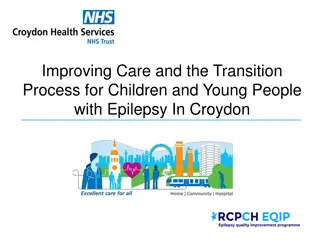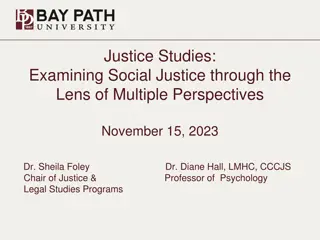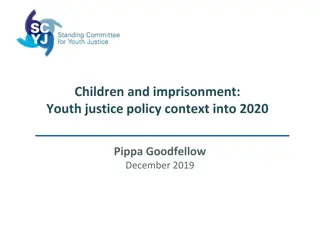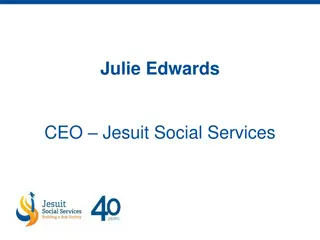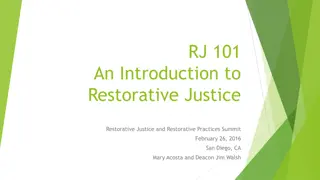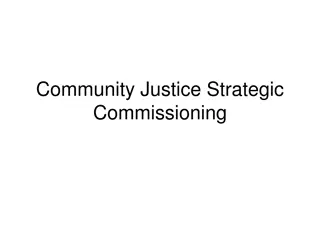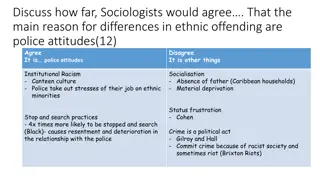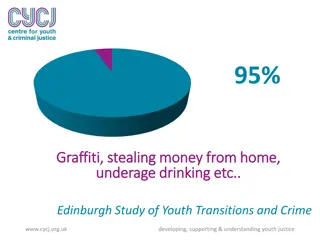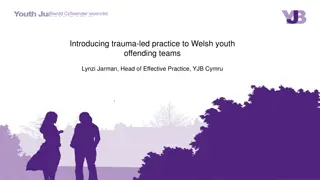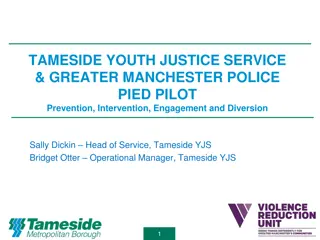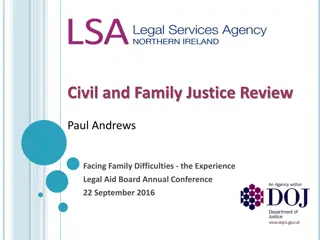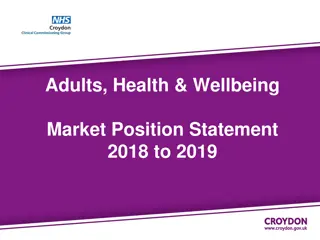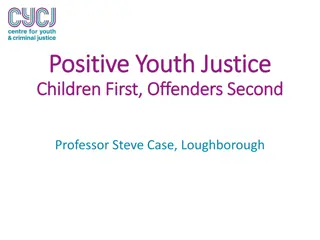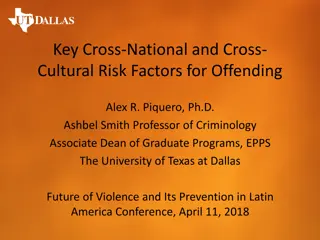Croydon Youth Offending Service Youth Justice Plan 2021 Overview
Detailed overview of the Croydon Youth Offending Service Youth Justice Plan for 2021, focusing on priorities, achievements, challenges, and responses to the COVID-19 pandemic. Emphasis on addressing overrepresentation of young black males and marginalized groups in the Criminal Justice System, with input from young people and families.
Download Presentation

Please find below an Image/Link to download the presentation.
The content on the website is provided AS IS for your information and personal use only. It may not be sold, licensed, or shared on other websites without obtaining consent from the author.If you encounter any issues during the download, it is possible that the publisher has removed the file from their server.
You are allowed to download the files provided on this website for personal or commercial use, subject to the condition that they are used lawfully. All files are the property of their respective owners.
The content on the website is provided AS IS for your information and personal use only. It may not be sold, licensed, or shared on other websites without obtaining consent from the author.
E N D
Presentation Transcript
CROYDON YOUTH OFFENDING SERVICE YOUTH JUSTICE PLAN 2021
CONTENT Introduction, vision and strategy page 2-3 page 6-10 Young Person(s) Feedback page 4-5 Vision page 11 YOS Structure and ethnicity make of staff page 12-13 Board Structure & membership page 14 - 15 Governance, leadership and partnership arrangements page 16-17 Resources and services page 18 -20 Performance 21-22 Key challenges and achievements in 2020/21 page 23-27 Responding to the pandemic and recovery from COVID-19 page 28-29 Action Plan 2021/22 summary & Youth Justice Plan approval page 29-31 Plan sign off by Chair of Youth Crime Board 32 2
INTRODUCTION, VISION AND STRATEGY Executive Summary and Introduction: This document details Croydon Youth Offending Teams Youth Justice Plan as defined by the Crime and Disorder Act 1998. The objective of this plan is to set out priorities for the Youth Offending Service and Statutory partners for the year 2021/22 whilst reflecting and learning from both achievements and areas of improvement in the year 2020/21. This plan is particularly unique when considering the unpredicted pandemic that occurred in 2020 and is still being responded to in 2021. The plan will elaborate on both the Youth Offending Service s response to COVID 19 and delivery, alongside the recovery plan post COVID and the impact/aftermath of COVID into 2021 for this particular cohort of young people. This year the plan will also heavily emphasise the stark overrepresentation of young black males within the existing cohort and the Service s commitment to address and challenge discrimination and oppressive practice linked to this group and other marginalised groups who are disproportionately represented within the Criminal Justice System. Such commitment is detailed in the Youth Offending Service Disproportionately Action Plan (DAP), devised collaboratively with Croydon BME Forum and referenced within the wider Youth Justice Plan.
VOICE OF THE CHILD The Youth Justice plan has been influenced by Young People and their families, with a specific voice participation group being devised and delivered by the Local Authorities Youth Engagement Team to ensure those who access services are heard. This group ran through the months of April and May of 2021 and provided opportunity for the Youth Offending Service and Youth Crime Board to reflect more broadly on issues pertaining to this group and experiences of the Criminal Justice System understood this being incorporated into the strategic and operational delivery. The plan will continue to consider researched factors why young people are more likely to come into contact with the Criminal Justice System and how the Youth Offending Service works to offer preventative programmes for those at risk of entering the Criminal Justice System alongside diverting and reducing offending of those known. The borough is known to have high levels of Serious Youth Violence, gang violence and knife crime and whilst this has decreased during the past 12 months the plan will elaborate on the Youth Offending Services and partners continued efforts to rehabilitate those deemed high risk in addition to responding to public protection and public confidence.
I saw a fight take place at court, but if it wasn t for the security guards, the fight could have been worse . Its good YOS do court list checks for gang problems etc I need reminding sometimes of what the update is on some of my pending police matters Out of the social graaacess, I identify most with ethnicity, as I am proud of my Jamaican roots The main things I enjoyed about my YOS Experience is when we did group sessions, and then all played football afterwards . my YOS Worker gets on to me, but I know its because she wants me to do well, and complete my YOS Order I know what reparation is, its basically making up for what I did . I don t think there is much else YOS can do to support young people, everything so far has been fine I feel supported by my YOS Officer The police arrested me and my friends one day, the white males who where in my group were let off the hook, and although me and my black female friend had nothing on us, we were the ones who were arrested I when I first when to court, I didn t know what to expect, I just thought I needed to act as innocent as possible I feel that I am better off with the support of my yos officer, than I would have been without them
The plan will outline the Youth Justice Boards and locally agreed key indicators: -Reduction in First Time Entrants -Reduction in the use of custody -Reduction in re-offending -Increase in Education and Employment particularly for those 16+ -Suitable accommodation -Accessibility to universal offers including health. The key indicators are used to measure the Youth Offending Services delivery outcomes and whilst much progress has been made in all domains the plan will ensure we do not lose sight of such progress. In 2019 Croydon Youth Offending Service was also subjected to HMPI Inspection where it was given a rating of requires improvement . Consequently, an improvement plan was assigned, the Youth Justice Plan will demonstrate the YOSs response and continued work to respond to areas of improvement needed and how the Youth Crime Board (YOS Governing Body) is working closely to ensure that YOS and Partners are meeting all recommendations listed. This document will also detail transparently the financial make-up of the YOS and expenditure of resources, paying particular attention to the Youth Justice Board grant and ways the grant is used to deliver a Youth Justice Service that is responsive to local needs.
Background: Croydon has a population 403,593 of which 84,027 are between the age of 0-16 making it the largest youth population within London. At the end of March 2021, 657 children had Child In Need Plans (not including children open to Children with Disabilities), 280 children were subject to a Child Protection Plan, 698 children are looked after with 210 children being unaccompanied minors. At the time of writing 14 of those LAC children were open to YOS but were sighted on higher tier Orders and more disappointingly are often found in the custody cohort. A further 25 where subject to Child in Need Plan,13 to a Child Protection Plan, and 25 were previously on a Child in Need Plan, 13 previously on a Child Protection Plan. Since March 2020 the YOS has been involved with 3 Serious Case Reviews following the death of 3 children known to our Service. The fatalities included 1 murder and 2 suicides. Whilst Serious Youth Violence has seen a decrease during the period of 2020/21 in the borough the first review reminded us that we must continue to reflect and deliver a targeted responses for those involved and at risk from Serious Youth Violence. The suicides have also brought strategic and operational thought on the boroughs Suicide Prevention Strategy. The YOS has also begun to ensure that SCRs are discussed at both the Managers meeting but also more widely across the Team to ensure learning is embedded and reflected upon.
The borough is 88.06km and whilst the North part of the borough is more urban and highly populated the southern part of the borough is more typical of suburbia. The boroughs hot spots as deemed by the MET remain to be around the Town Centre particularly West Croydon and north parts of the borough, in addition to more eastern wards such as New Addington and the Shrublands area and this correlates with data as to where our young people reside. These areas are more likely to have applications of Section 60 Stop and Search and therefore there is geographically a connection with more systemic factors that are linked to children entering the Criminal Justice System. more systemic factors that are linked to children entering the Criminal Justice System. The borough is 88.06km and whilst the North part of the borough is more urban and highly populated the southern part of the borough is more typical of suburbia. The boroughs hot spots as deemed by the MET remain to be around the Town Centre particularly West Croydon and north parts of the borough, in addition to more eastern wards such as New Addington and the Shrublands area and this correlates with data as to where our young people reside. These areas are more likely to have applications of Section 60 Stop and Search and therefore there is geographically a connection with Data:
Wards No. % Broad Green 27 6.96% Bensham Manor 26 6.70% Thornton Heath 26 6.70% New Addington North 25 6.44% Selhurst 24 6.19% West Thornton 24 6.19% Woodside 23 5.93% South Norwood 20 5.15% New Addington South 18 4.64% Other 175 45.10% ETE Providers No. % None 92 23.77% Croydon College 27 6.98% Saffron Valley Collegiate - North (Phil Edwards) 17 4.39% Harris Academy South Norwood 13 3.36% Saffron Valley Collegiate - South (Moving On) 13 3.36% Beckmead School 12 3.10% Harris City Academy Crystal Palace 10 2.58% Harris Academy Purley 9 2.33% Cookham Wood Youth Offender Institute 6 1.55% Other 188 48.58% Total 387 100.00%
A continuous analysis by YOS remains to identify the following risk factors that require both strategic and operational responses: Increase in drug type offences reported in 2020/19 and consequently a higher demand to consider contextual safeguarding and continued growth of county-lines. Child missing periods and the correlation with contextual safeguarding concerns High levels of exclusion within our cohort with most of the young people deemed high risk and monitored by schemes such as the Integrated Offender Management Scheme, know to the local Pupil Referral Unit. High levels of NEET amongst our 16+ cohort Domestic Violence and unresolved parental trauma frequently identified. Multiple Adverse Childhood Experiences identified within the young people known to the Service Unsuitable or poor living conditions Unidentified Speech and Language difficulties that are detected by our SALT workers Mental health concerns and untreated diagnosis Parent mental health Many young people known to YOS also known to Social Care & Early Help in advance of YOS contact.
VISION Children and young people in Croydon will be safe, healthy, happy and will aspire to be the Best they can be. THE FUTURE IS THEIRS.
Director of Early Help & Children Social Care Head of Service Access, Support and Intervention Early Help and Social Care Service Manager YOS and Youth Engagement Education Manager Business Support SALT x2 Skill Mill Lead 16+ Worker Forensic Psychologist Operational Manager Serious Youth Violence & Youth Engagement Operational Manager Court, Interventions, Custody and Probation Operational Manager Out of Court & Referral Orders Youth Engagement Coordinator Business Support Youth Engagement Youth Engagement coordinator Gangs & IOM Coordinator Business Support 0.5 Practice Manager Custody & Resettlement Practice Manager Court & Probation Substance Misuse Worker RJ Practice Manager Out of Court YOS Police L&D worker Referral Order coordinator Practice Manager Referral Orders Coordinator Youth Engagement Workers x8 2x Gangs Workers 1x Adult Gangs Worker 1x Prvention Gangs Worker YOS Officer x4 Victim coordinator YOuth Engagement Workers x7 YOS Officer x4 YOS Officer x2 Probation Officer 0.5 Court Support Officer YOS Officer x 4 YOUNG CROYDON STRUCTURE CHART (YOS AND YOUTH ENGAGEMENT)
STAFF GENDER AND ETHNCITY Referral Order Panel Volunteer Strategic Manager Operational Manager(s) Practice Manager(s) Administrativ e Practitioners & specialists Other -Youth Engagement Student Total Male Female Male Female Male Female Male Female Male Female Male Female Male Female Male Female Asian 0 0 0 0 0 0 0 0 0 1 0 0 0 3 0 0 4 Black 0 0 0 0 0 4 0 0 5 5 0 1 2 4 0 0 20 Mixed 0 0 0 0 0 0 1 0 0 3 0 0 0 0 0 0 4 White 0 1 1 2 1 1 0 4 2 8 0 1 2 3 0 0 24 Any other ethnic group 0 0 0 0 0 0 0 0 0 0 0 0 0 0 0 0 0 Not known 0 0 0 0 0 0 0 0 0 0 0 0 0 0 0 0 0 Total 0 1 1 2 1 5 1 4 7 17 0 2 4 10 0 0 53
Safer Local Strategic Partnership Neighbourhood Board Health Wellbeing Board Safer Croydon Partnership Safeguarding Boards Youth Crime Prevention Board Confidence and community engagement Anti-social behaviour and enviro crime Managing Offenders Domestic and Sexual Violence Gangs & SYV IOM Hate JAG MARAC Risk Management and Vulnerability Panel (YOS) also used for CBO discussions MAPPA Confidence ASB Forum DHR Panels Prevent Safer Streets GOVERNANCE Channel RVMP Youth IOM Panel
Youth Crime Board (YCB) Members: Member: Area: Email: Debbie Jones Executive Director Chair Debbie.Jones@Croydon.gov.uk Roisin Madden Director Roisin.Madden@croydon.gov.uk Lewis Collins DCI MET Police Lewis.E.Collins@met.police.uk Emma Cater YOS Service Manager Emma.carter@croydon.gov.uk Selene Grandison National Probation Service Selene.Grandison@justice.gov.uk Uzma Qureshi Court Legal Team Manager uzma.qureshi@Justice.gov.uk Chris Rowney Head of Violence Reduction Unit Christopher.Rowney@croydon.gov.uk Iain Lowe HOS - Access, Support and Intervention Early Help and Social Care Iain.lowe@croydon.gov.uk Ann Tighe CAYSH Housing Ann.Tighe@caysh.org Andrew Brown BME Forum Community Sector andrew@bmeforum.org Val Burrell-Walker Fair Access Manager Education Valerie.burrell-walker@croydon.gov.uk Fiona Simmons CCG Health Fiona.Simmons@swlondon.nhs.uk Jo Jack Post 16 Participation and NEET Manager Education Jo.Jack@croydon.gov.uk
GOVERNANCE, LEADERSHIP & PARTNERSHIP Governance: The YOS and Youth Engagement Service, Service Manager reports to the Head of Service Access, Support and Intervention(s) alongside Single Point of Contact, Assessments and Early Help, this being part of the Director of Early Health and Children s Social Care directorate. The positioning of the Youth Offending Service provides strong working relationships within Social Care and Early Help. The YOS, however remains to have strong partnerships with the Violence Reduction Unit and substantial joint operational and strategic planning occurs between Senior Manager s, particularly in response to Serious Youth Violence and knife crime. Whilst the YOS is representative at a number of Boards, the Youth Crime Board, Chaired by the Executive Director of Children, Families and Education has overall accountability for the YOS with this Board reporting into the Safer Croydon Partnership. The Youth Crime Board has recently reviewed membership and is due to host a day event to explore and revaluate leadership and governance amongst partners. The partnership currently consists of both primary and secondary Senior members: Metropolitan Police, Education, Social Care, Health, Court, Violence Reduction Unit and Probation in addition to the Community Sector, Commissioning and Housing. The Chair of the Board remains to be the Executive Director of Croydon Social Care and Education. The Board is held quarterly and is provided with a detailed report on YOS key indicators in addition to data analysis on the cohort profile: ethnicity, gender, age, where the cohort resides in the borough, which schools they go to, number of LAC Children, number of SEND children with Educational Health Care Plans. More recently work has been undertaken to map intelligence on Sexual and Criminal Exploitation and the use of National Referral Mechanism (NRMs). This is work in progress. A yearly agenda has been set to ensure all major topics are covered.
The Youth Crime Board oversights all existing plans relevant to the Youth Offending Service currently this includes: - - - - Improvement Plan following HMPI inspection 2019 Self-Assessment against Standards for Children in the Youth Justice System completed in 2020 Actions plans from monthly thematic audit(s) completed by YOS Management Team Disproportionately Actin Plan March 2021 The Board also has the role of leading on the planning from all partners on the Youth Justice Plan for 2021/22 and for the formulation plan Board discussions in addition to separate meetings were held to ensure all areas of focus were accounted for taking into account additional plans where expectations of YOS may be referenced included the Serious Youth Violence Action Plan held by community safety, regularly discussed at Croydon Safer Partnership Board, chaired by Local Councillors and Police.
Resources & Services Youth Justice Board Grant The purpose of the grant has been revised through the Youth Justice Board for England and Wales (amendment of Functions) Order 2015, article 2c. Monies are now given expressly to make grants to Local Authorities and other persons for the purpose of the operation of the youth justice system and the provisions of youth justice services, with a view of achieving the following outcomes: Reduction in re-offending Reduction in the use of custody Reduction in the number of first time entrants Effective safeguarding Effective public protection Improving the safety, wellbeing and outcomes of children in the system.
Resource from YJB Grant Activity Cost Senior Education Worker Oversees Pre & Post 16 Offer Oversees Skill Mill Project Oversees SALT 59,802 YOS Operational Manager Oversees Out of Court Oversees Referral Orders Oversees Restorative Justice Link for YOS Police Link for L&D Worker 74,009 YOS Operational Manager Oversees Court/Probation/Resettlement/Intervention s Supervises Substance Misuse Supervises Practice Manager x2 61,471 YOS Practice Manager Leads on Court and Probation Supervises 4 YOS Practitioners 43,590 YOS Practice Manager Leads on Out of Court Supervises 4 YOS Practitioners 43,590 YOS Officer Generic YOS Work case co-ordination PSRs Court Assessment 23,800 Restorative Justice Co-ordinator Project Management of reparation and victim restorative Justice 45,061 Restorative Justice Worker Delivers Victim RJ 46,501
Agency Staffing Costs Payments in Kind Revenue Other delegated funds 69,000 Total LB Croydon MET Police National Probation Service Health Service YJB Grant 1,237,000 130,000 23,750 3000.00 110,000 483, 115 129,000 Other *HRA & Skill Mill MOPAC/VRU Total 262,000 + 41k 2112,865 375,000 2,487,865 The Crime and Disorder Act 1998 requires partner agencies (Police, Health, Social Care and the National Probation Service and Education) to provide a nominated person to the Youth Offending Service. The table above shows the overall Partner Contributions to the Youth Offending Partnership Budget 2021/22
KEY CHALLENGES AND ACHIEVEMENTS IN 2020/21 Achievements: Response to COVID 19 Croydon Youth Offending Service remained present at Croydon Youth Court 6 days a week, the expectation being higher than any other London YOS. In the initial stages of the pandemic the Youth offending Service worked hard with partners to ensure young people had access to technology and the internet. We continued to deliver both 1:1 interventions face to face for those who are deemed high risk or vulnerable and continued to deliver out of court disposals and referral order panels in addition to groups using virtual means. We also increased our contact for those within the secure estate and ensured that they were being considered despite accessibility difficulties. Reduction in the number of young people entering the Criminal Justice System for the first time whilst 2020/21 saw a minor reduction from the previous year (110 20/21 compared to 122 19/20) this number has remained to steadily reduce across a 4 year period. Reductions in young people entering custody in 2019/20 it was recorded that 14 young people went to custody. This saw a drastic marked decline from previous years. In 2020/21 there were 16 custodial sentences that involved 13 individuals, sadly many of those individuals whom had been seen in the previous year, noting that many of those receiving custody were part of a small number of children repeatedly re-entering custody. Reduction in the number of young people re-offending 484 outcomes were recorded in 2019/20 and we saw a reduction (including diversions) 378 outcomes in 2020/21 (an overall reduction of 22%). Whilst we believe that this reduction was influenced by the pandemic we have continued to see a steady decline in outcomes since 2018/19. Gangs Matrix and IOM The Youth Offending system jointly with the MET Police runs the IOM scheme (Integrated Offender Management). This scheme prioritises those who are deemed high risk and carry out certain types of offences that pose a risk to public protection. During 2020/21 33 children were placed onto the scheme with 15 being deselected following risk reducing and the offer of targeted interventions being delivered. 6 of the 33 were also moved onto the adult scheme ensuring that any concerning risk is continued to be monitored.
Achievements Continued: Training Despite the introduction and reliance of remote working Croydon Youth Offending Service delivered training to staff on a number of topics during 2020/21 Restorative Justice, Speech and Language Awareness, ASSET+ refresher, Trauma Informed Approach, Diversity and Pre-sentence Reports, Social Media and young people these alongside external offers including INSET training delivered by a variety of providers and co-ordinated by the Youth Justice Board. Departmentally training was also delivered to staff on a number of key topics including safeguarding and exploitation and webinars held throughout the year. Improved Partnership working to protect young people at risk from criminal and sexual exploitation The Youth Offending Service remain to have a presence at key Boards and Panels, however in 2019 a Complex Adolescent Panel was devised representative of Partner agencies including Social Care, Health, Police, Housing and is Chaired by a Head of Service (AD equivalent). This panel has provided the Youth Offending Service with a structured place to escalate concerns and to work collaboratively with other Services. Improved Education and Speech and Language Offer Each young person in contact with YOS is screened by a SALT Worker. The Youth Offending Service holds two 0.5 posts. This has allowed us to detect and identify any communication difficulties not only to assist with our work but to advocate for Services. We also commission a 16+ worker who takes an outreach approach when working with NEET young people. This response has seen a reduction in NEET numbers across the Team despite the challenges of COVID. Another positive and responsive initiative has been the implementation of Skill Mill a Social Enterprise employment scheme where the YOS employees 8 individuals across the year providing them with opportunities to gain skills in a number of areas. This scheme has seen some of most high risk young people, reduce their offending and leave with both qualifications and work experience.
Challenges: The context of Croydon is not without its challenges, the borough has a large children s population and we remain to see a number of Looked After children placed within the borough in addition to high numbers of unaccompanied minors. This makes the borough a busy place and this is reflective within the YOS cohort and throughput. Whilst Croydon has seen a reduction in Serious Youth Violence and violent related offences it has seen an emergence of drug related offending and concerning evidence of county-lines and child exploitation. Safeguarding Children from such risks is complex and has posed new challenges for practitioners. In some rare instances there is a need to relocate children away from the borough for their own protection and it is well known that Nationally there is a demand for placements in addition to challenges with housing when attempting to move a family away. Looked After Children (LAC) Whilst the number of LAC Children has reduced within the cohort we remain to see looked after children more prevalent amongst our higher tier disposals and within the custody cohort. These children have already experienced disadvantages and trauma by virtue of their status and we continue to look at this closely with our Social Care colleagues adopting a trauma informed approach. Conversely, we remain to see a number of Looked after Children placed in borough by other authorities, these are often some of the most vulnerable children we work with and all efforts are made to support them during their time in our borough. On average the number of Out of Borough LAC children amounts to a YOS Officer Caseload. Disproportionately We continue to see an overrepresentation of young black males within the YOS cohort and continue to evolve our response to systematic and institutional racism that influences the perseverance of such numbers. The YOS has devised a Disproportionately Action Plan which separates each section of our work and details how we can proactively address oppressive practice and inequality. The YOS has a Practitioner who takes Lead on issues related to Diversity and this is discussed at the Practitioners Reflective Practice Forum which feeds into Management Meetings for actions to be considered and where necessary raised at the Youth Crime Board. The Lead has presented at the Youth Crime Board, this alongside collaboratively working with the BME Forum and forming part of a wider strategic discussion with partners has enabled us to be more informed and retain more focus on this matter. In response we have delivered a number of Young Male Groups inviting a number of inspirational black male professional guest speakers to speak to our young people on the topic of the Criminal Justice System and future aspirations. The group was positively referenced in an article written for the law society. Operationally we also monitor closely any under 14 year olds who enter into the system and work hard at ensuring all efforts are made to divert this younger part section of YOS to avoid re-occurring. Exclusions and Managed Moves The Youth Offending Team remains to see a high percentage of young people who have been excluded, often before they reach contact with the Criminal Justice System and there is a distinct correlation with children struggling in education settings and YOS. The Integrated Offender Management scheme a form of monitoring, primarily focused on young people causing the most high risk offences, jointly by the YOS and Police, has seen a clear link with those monitored and those in attendance at alternative provisions. This places an emphasis on the need to retain children in mainstream settings where possible and to ensure needs are identified and supported much earlier on. Strategic discussions on this matter occur both nationally and locally and the YOS is committed to working with schools to support retention.
Challenges continued: Probation Despite an ever growing cohort of 17 year olds we have seen a reduction in Probation Resource during the period of 2020/21. From 2.0 posts we now have 0.4. Despite the size of the Youth Offending Service we have a similar resource allocation to YOS(s) of much smaller compositions. The increased focus on transitions from youth to adult services is therefore more increasingly challenging and this will be an ongoing priority within 2021/22. COVID 19 The YOS has yet to fully grasp the impact of COVID 19 upon both the system and young people and their families. We are anticipating an increase of first time entrants and have already begun to see time delays with Court appearances. We are yet to see the full impact upon the wellbeing of YOS young people including the impact upon mental health needs and educational needs. Whilst we can not fully analyse or predict the impact we remain to have appropriate staffing levels to manage increases and will continue to assess the needs moving forward. Health Offer We are in the process jointly with SLAM colleagues reviewing the L&D offer for Out of Court young people and those presenting in the Police custody suite. These revisions will look to ensure we have the right grading with the presenting need. We remain to have a Speech and Language Offer but have struggled to find replacements within the NHS and therefore recruitment has posed problematic often leaving a gap. In 2020 CAMHS were also decommissioned and replaced with an in-house systemic Team where the YOS has been assigned a Forensic Psychologist. We continue to review the benefits of these changes. Physical health needs we have since HMPI Inspection analysed the physical health needs of young people twice and the outcome is they vary considerably. We have submitted data to commissioning and remain to advocate for a service. This has been raised at Directorate level and will remain a priority for the YOS in 2021/22. We continue however to ensure we support young people with their identified health needs. Response to Victim(s) From 31st March 2020 until the 1st April 2021 there were 229 identified victims of which 178 contacts were made (77.7%). There were varying reasons for the 51 not contacted. However, 78 of those identified did not reply, 21 (9.1%) declined any form of service and 79 engaged in varying forms of restorative justice (34.5%). Comparatively, Out of Court cases, 109 victims were identified, 85 were contact (78%), 30 did not reply (27.5%), 15 (13.7%) declined any service and 40 (36.69%) engaged in restorative justice processes. The cohort largely consisted of male victims (over 60%) and 50% of those identified were under 18 year olds. What remains concerning is the number of persons who identified as mixed heritage who made up the cohort (50%). Details of findings are due to be presented to the Board for all partners to consider in June 2021. Victims and engagement remains to be centric in the YOS delivery and viewed as a priority. Whilst not all victim s partake in an offer of service we remain to consider victim(s) in our plans, risk management and place heavy emphasis that they have a say in licence formation and pre-sentence report(s).
RESPONDING TO THE PANDEMIC AND RECOVERY FROM COVID-19 Since March 2020 the YOS has continued to offer a Service using a hybrid model. In essence young people were grouped into 3 categories Priority 1, 2 & 3. Young people in group 1 were viewed as the highest risk and an expectation was set that they remained to be seen. YOS Officer(s) worked in partnership with Social Care, Education, Placement Providers and the Community Sector to ensure they were sighted each week by a professional. Priority 2 groups face to face work was more discretionary but virtual and telephone contact was expected, similarly for Priority group 3. At the beginning of the Pandemic a joint task with Social Care was to ensure that all young people had access to technology and the internet to ensure young people were accessible but also to enable them to communicate with the outside world and attend education alongside other appointments including health. Custody - Particular attention was given to young people in custody, whereby the initial response was no direct contact. Ensuring those children had telephone access to families and friends, in addition to sending them educational material and items for stimulation was reviewed and responded to. An expectation of more frequent telephone contact with YOS was also encouraged. Court We have remained to attend Court physically for 6 days a week, albeit we decreased staff numbers and ensured that attendance was in line with Government guidance and took into account the safety of our staff. We did this jointly with the Court and have regularly met to review. We have our own Office at Court which was cleaned in line with guidance and we provided additional cleaning materials for staff to use should they wish. PPE is also always available at court. Out of Court During the pandemic we offered out of court disposals such as triage and cautions via virtual means jointly with the MET. Where a need was identified and virtual not appropriate we sought alternative ways to engage young people and relied heavily on the use of community spaces. Referral Order panel(s) RO Panels seemed to work well virtually and were easier to set up virtually, similarly progress panels were delivered he same way and this is one area where we potentially will retain this form of working. Performance indicators have improved by carrying out panels in this way. Groups Despite challenge we have run a number of groups since March 2020 including Weapons Awareness, Young Males Group a group designed for young black males where black male professionals were guest speakers discussing an array of topics, Out of Court Group and Voice Participation
Whilst the groups have been virtual they have been well attended. Moving out of COVID we will begin to offer face to face groups. Staff COVID impacted our staff in different ways. Whilst some staff were able to continue and be adaptive to new ways of working others were shielding. Generally we have complied with corporate direction and government instruction and have fully assessed each individuals needs and ensure we are taking into account staff(s) wellbeing both physically and emotionally. We have ensured that staff are provided with PPE, are made aware of counselling services, and where necessary occupational health referrals completed and devised a risk assessment when accessing young people directly. Whilst our main building was closed the Council s corporate building remained open fully risk assessed and staff were able to access this building and a number of community partners also provided us with their spaces, again risk assessed. Testing is on offer daily to staff from the corporate building and all those who attend court have been subject to lateral testing. Given the nature of our work vaccines were also on offer early-on during the roll out. Staff Training and Development Croydon YOS has utilised the YJB INSET training that includes a catalogue of training offers related to Youth Justice, alongside hosting a number of training days internally. Such training has included: ASSET+ Refresh, Restorative Justice refresh, Speech and Language Training, discussing race in PSRs,
Priorities 2021/22 Recovery Plan COVID 19 Outcome Actions To increase direct contact with young people. To continuously analyse impact of COVID and its impact on young people whether educational/mental health etc and respond to any emerging concerns. To return to running groups To use hybrid model where appropriate remaining to offer a level of flexibility with virtual and direct work. To ensure staff are supported and their wellbeing considered during transition period from lock-down. Disproportionately Disproportionately in cohort to be discussed openly and to work in partnership to explore and respond to figures. Services/interventions to be culturally in tune with those in receipt. Staff to be fully trained in cultural competency and have full awareness of anti-discriminatory practice. DAP plan completed setting out everyone(s) actions and contributions across the YOS to address disproportionately. DAP Plan to be cited in each staf Training delivered during 2021 to ensure all staff are trained in cultural competency YOS DAP plan to fit with wider Strategic Plan of Council. Serious Youth Crime To identify those who are committing Serious Youth Crime or at risk of and offer tailored interventions to meet the needs of young people and to protect the public. Interventions to take into account adverse childhood experiences and to be trauma informed in recognition that those carrying out SYV have often been victims themselves. Regularly complete SYV Stocktake to ensure both strategically and operationally we are meeting with standards. To continue to monitor those assessed as high risk through IOM scheme and gangs matric with use of RVMP Panel to ensure we are targeting specific needs related to risk. To ensure Gangs and IOM has set standards and performance indicators. Work with partners including schools and early help to identify risk earlier. ACTON PLAN 2021/22 - AS IDENTIFIED BY STAKEHOLDERS, YOS OFFICERS AND YOUNG PEOPLE AND FAMILIES.
Reduction in 16+ NEET Cohort To reduce number of 16+ NEET By offering a bespoke service that supports young people to meet with their individualised needs in both further education and employment. Continue to assess the education and employment needs of this group and provide services and advice based on individual need. To continue to work collaboratively with partners to support this group including SEN/Post 16 Services/Community Sector/Providers/Job Centre/Croydon Works. To continue to run Croydon YOS employability scheme Skill Mill L&D Offer to be fully reviewed and implemented for those non-statutory cases. SALT Offer to remain and to be completed at earliest opportunity. Physical Health Offer to be confirmed and implemented. Systemic and Forensic Psychology Offer to be reviewed. Use of re-offending tracker to identify those who are high risk or medium and to ensure that interventions are appropriate and targeted. Intervention Plans to be regularly reviewed and oversighted by Manager(s) to ensure working. Use of IOM scheme to monitor most high risk. Appropriate use of external controls to reduce offending. Systemic work to ensure families and carers are working with us to help reduce offending behaviour. Partnership work Set up of the DIVERT programme for those arrested and not charged. Use of Community Sector to reintegrate and offer resources away from CJS to engage young people. Close work with Youth Engagement and Early Help to work in partnership with those who are viewed at risk of entering at the earliest opportunity. Intensive mentoring and workshop offer via the My Ends Project to work with those viewed as high risk within the Out of Court Team. Health Offer To identify and response to both physical and mental health needs of those entering the Criminal Justice System. Reduce Re-offending Rates Reduce harm to direct and indirect victims of offending. Assist young people from further contact with the Criminal Justice System Reduce First Time Entrants More young people being diverted away from the Criminal Justice System.
Improve data quality and analysis. More detailed analysis to ensure service has appropriate resource to meet with statutory objectives. Data sets provided are extensive to ensure we have full demographic information concerning young people and their needs. Ensure data also consists of surveys and qualitative information from voice participation groups that are Service User Lead. Use of YJB data such as disproportionately toolkit, SYV stocktake tool, re-offending tracker and quarterly data. Continued monthly audit on themes to be carried out by Management Team to look for general trends and performance monitoring. Improve data related to county-lines jointly with Social Care. Victims For YOS Officers to be both child and victim centric in their work. To ensure victim(s) and potential victims are at the core of our work. To ensure we are offering restorative justice interventions and capturing the voices of victim(s) as early as sentencing. All staff to be trained on victim awareness and restorative justice offer. For staff to evidence consideration of victims and potential victims in every aspect of their work from pre-sentence reports, assessments, plans and delivery of intervention. Suicide Awareness In response to the two suicides experienced by Croydon YOS in last 12 months to ensure all staff have an awareness of mental health and how to respond appropriately. To ensure staff are fully aware of suicide prevention strategy. All staff to be mental health first aide trained. All staff to understand and have awareness of suicide prevention strategy. All staff to have full understanding of partnership work and information sharing in line with London Child Protection Procedures.
Name Role Signature Debbie Jones Chair of Youth Crime Management Board
